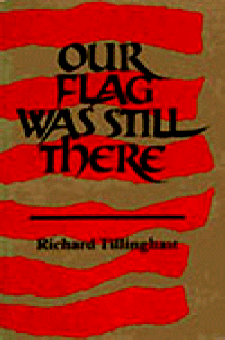
"Chessie," the Chesapeake and Ohio's
advertising mascot, snoozes
under sixty-mile-per-hour lamplight.
Two tabby kittens gaze saucer-eyed at their tomcat dad,
who sits alertly on his haunches,
soft fieldcap cocked to one side above neat,
pleasure-pursed lips and regimental whiskers.
One paw bandaged.
A Congressional Medal of Honor
red-white-and-blue-ribboned around his neck.
As convincingly at attention as a military-style,
family-oriented cat can be in a Pullman car.
On his well-groomed chest, rows of campaign ribbons.
A dignified, "can do" look
hovers about his muscled smile.
In the luggage rack, a U.S. combat helmet
and a rising-sun flag in tatters.
I had a flag like that.
One of my three red-headed Marine cousins
brought it back from the South Pacific.
I thumbtacked it to the wall of my room.
The Japanese who had fought under it
perished in fierce firestorms.
They and their flag went up in that conflagration. Our flag was still there.
Against a backdrop of blue sky and innocent clouds,
a line of six blunt-nosed P-47 fighters-
boxy and powerful like the grey Olds
we bought after the War
and drove to the Berkshires for the summer-
flew off on a mission to Corregidor.
The flag, unfurled in the stiff breeze,
was superimposed over the line of airplanes
on the cover of the Sunday magazine
one June morning in 1943.
The wind that made it wave as it does in pictures
blew off long ago toward Japan.
The sun nooned over orange groves and beaches.
Sparks from welding torches
illuminated the sleep of the City of the Angels
and darkened the sleep of others
as women workers beside the men
lowered masks over their faces,
and the children of New Jersey and Mississippi,
Europe and Detroit,
labored to make aluminum fly
and set afloat fleets of destroyers
and submarines radaring to the kill.
Looking ahead, there was a world of blue-grass lawns,
paneled wood enameled white, grandparents' faces
rosy over reassuring, hand-rubbed banisters.
Yale locks, brass door-knockers, hardwood floors,
the odor of good furniture and wax,
a holiday design of holly leaves and berries on a stiff card,
a little girl holding gift packages as big as she is,
a boy, a real boy, bright as a new penny.
But now, in '43, the men and women pulled apart
like the elders of some stern, taboo-ridden tribe,
putting off till after the War the lives
of those who in twenty-five years
stood baffled on the 4th of July among uncles,
drove good German cars,
floated in tubs of hot, redwood-scented water with friends,
and greeted each other with the word, "Peace."